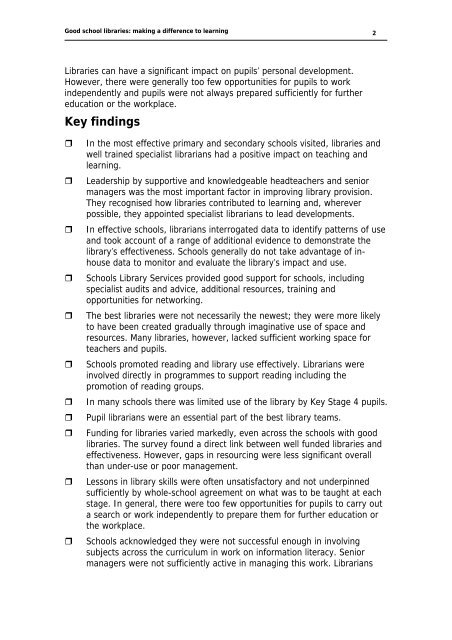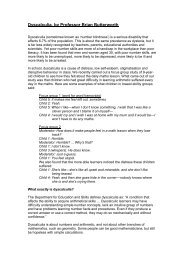Good school libraries: - Digital Education Resource Archive (DERA)
Good school libraries: - Digital Education Resource Archive (DERA)
Good school libraries: - Digital Education Resource Archive (DERA)
You also want an ePaper? Increase the reach of your titles
YUMPU automatically turns print PDFs into web optimized ePapers that Google loves.
<strong>Good</strong> <strong>school</strong> <strong>libraries</strong>: making a difference to learning 2<br />
Libraries can have a significant impact on pupils’ personal development.<br />
However, there were generally too few opportunities for pupils to work<br />
independently and pupils were not always prepared sufficiently for further<br />
education or the workplace.<br />
Key findings<br />
<br />
<br />
<br />
<br />
<br />
<br />
<br />
<br />
<br />
<br />
<br />
In the most effective primary and secondary <strong>school</strong>s visited, <strong>libraries</strong> and<br />
well trained specialist librarians had a positive impact on teaching and<br />
learning.<br />
Leadership by supportive and knowledgeable headteachers and senior<br />
managers was the most important factor in improving library provision.<br />
They recognised how <strong>libraries</strong> contributed to learning and, wherever<br />
possible, they appointed specialist librarians to lead developments.<br />
In effective <strong>school</strong>s, librarians interrogated data to identify patterns of use<br />
and took account of a range of additional evidence to demonstrate the<br />
library’s effectiveness. Schools generally do not take advantage of inhouse<br />
data to monitor and evaluate the library’s impact and use.<br />
Schools Library Services provided good support for <strong>school</strong>s, including<br />
specialist audits and advice, additional resources, training and<br />
opportunities for networking.<br />
The best <strong>libraries</strong> were not necessarily the newest; they were more likely<br />
to have been created gradually through imaginative use of space and<br />
resources. Many <strong>libraries</strong>, however, lacked sufficient working space for<br />
teachers and pupils.<br />
Schools promoted reading and library use effectively. Librarians were<br />
involved directly in programmes to support reading including the<br />
promotion of reading groups.<br />
In many <strong>school</strong>s there was limited use of the library by Key Stage 4 pupils.<br />
Pupil librarians were an essential part of the best library teams.<br />
Funding for <strong>libraries</strong> varied markedly, even across the <strong>school</strong>s with good<br />
<strong>libraries</strong>. The survey found a direct link between well funded <strong>libraries</strong> and<br />
effectiveness. However, gaps in resourcing were less significant overall<br />
than under-use or poor management.<br />
Lessons in library skills were often unsatisfactory and not underpinned<br />
sufficiently by whole-<strong>school</strong> agreement on what was to be taught at each<br />
stage. In general, there were too few opportunities for pupils to carry out<br />
a search or work independently to prepare them for further education or<br />
the workplace.<br />
Schools acknowledged they were not successful enough in involving<br />
subjects across the curriculum in work on information literacy. Senior<br />
managers were not sufficiently active in managing this work. Librarians



